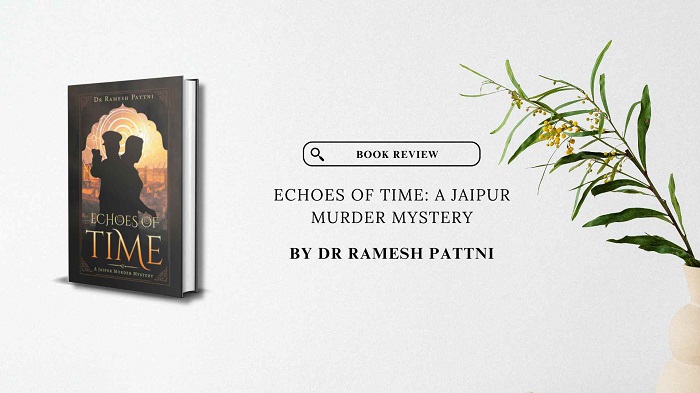Echoes of Time is a deeply evocative and introspective collection that explores the intricate relationship between memory, emotion, and the unrelenting passage of time. From the very first page, it invites the reader to pause, reflect, and listen to the whispers of their own past. The author has woven together a tapestry of feelings—love, loss, nostalgia, pain, and rebirth—each thread glimmering with authenticity. The title itself perfectly encapsulates the essence of the book: time is not merely a measure of passing days, but a living echo that reverberates through the chambers of our hearts long after the moments themselves have faded.
The language of Echoes of Time is lyrical, fluid, and emotionally charged, yet there is an admirable restraint in its expression. The author does not resort to ornamental flourishes or unnecessary dramatization. Instead, the writing derives its beauty from simplicity and truth. Every line feels carefully chosen, as though each word were placed with delicate intent to capture a feeling that most people experience but seldom articulate. The result is prose that feels both intimate and universal—a mirror that reflects the reader’s own emotions back to them in unexpected ways. It is a rare quality for a contemporary writer to evoke such resonance without overt sentimentality, and this book accomplishes that with remarkable grace.
At its core, Echoes of Time is a meditation on the nature of memory. The author portrays time not as a linear progression but as a cyclical force—something that bends, returns, and reminds. The past is never truly gone; it lingers in gestures, in unspoken words, in the quiet between heartbeats. Through this thematic framework, the book examines how humans carry fragments of their experiences, both beautiful and painful, into the present. Each poem, reflection, or passage becomes a moment of stillness, urging readers to slow down and feel the weight of what it means to remember. There is a deep empathy running through the work, an understanding that to be human is to live in constant dialogue with one’s own history.
The emotional range of the collection is impressive. It traverses moments of raw vulnerability and heartbreak but also offers glimpses of resilience and healing. Some passages ache with melancholy, while others radiate warmth and quiet hope. What binds them together is the honesty of the voice. The author does not shy away from depicting sorrow or the jagged edges of human experience. Yet even in the darkest moments, there is a sense of redemption—a subtle belief that time, though cruel, also teaches and transforms. The recurring motif of echoes becomes a symbol not only of remembrance but of endurance. Just as echoes fade and return, so do people find ways to rebuild, to rediscover themselves amid the ruins of what once was.
Stylistically, Echoes of Time balances between poetry and narrative reflection. There is a rhythmic flow in the writing that gives it a musical quality, almost as though the text itself breathes. The imagery is vivid but never overwhelming. The author paints scenes with delicate precision: a fleeting glance, a shadow stretching across a familiar room, a scent that awakens a long-buried memory. These sensory details ground the abstract emotions, allowing the reader to experience the feelings viscerally. The craft is subtle but confident—proof of a writer who understands that the most powerful emotions are often conveyed through silence and suggestion rather than explicit statement.
Beyond its aesthetic merits, the book’s philosophical undertone adds to its depth. The author seems to question the human desire to hold onto time, to trap fleeting moments in memory. Yet, at the same time, there is an acknowledgment that these echoes are what give our lives meaning. In revisiting the past, we confront our growth, our fragility, and our capacity for love. This introspection is not self-indulgent; it is purposeful, urging readers to embrace their own echoes—to find beauty in the things that once hurt, and to recognize that healing is not about forgetting but about remembering differently.
What makes Echoes of Time stand out is its quiet confidence. It does not demand attention through dramatic plot twists or sensational revelations. Instead, it earns its impact through authenticity and emotional precision. The author’s voice feels seasoned and reflective, as though speaking from a place of deep understanding rather than mere observation. This lends the work a maturity that is rare in contemporary writing, where speed and spectacle often overshadow sincerity. Readers will find themselves returning to certain lines, not because of their cleverness, but because they ring true in a way that only lived experience can.
As a whole, Echoes of Time is less a story and more an experience—a companion for anyone who has ever stood at the crossroads of past and present, wondering where the years have gone. It resonates with readers who have known love and loss, who have faced the quiet ache of memory and emerged with a deeper appreciation of life’s fragile beauty. It is a book that asks for patience, for stillness, for listening—much like time itself. And in that listening, one discovers the same truth the author seems to have found: that time does not merely take; it also gives. It gives wisdom, clarity, and the gentle reminder that every moment, once lived, becomes eternal in its echo.
In conclusion, Echoes of Time is a beautifully written, emotionally rich, and philosophically profound work. It stands as both literature and reflection, offering comfort to the wounded heart and insight to the contemplative mind. The book succeeds not because it tries to impress, but because it dares to be honest. Its echoes will linger long after the last page is turned, whispering softly to those who listen: that even as time passes, what truly matters continues to live within us.



